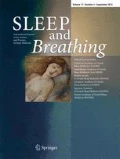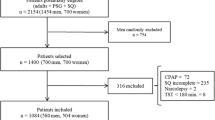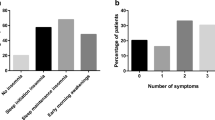Abstract
Background
Insomnia and obstructive sleep apnea (OSA) are the two most common sleep disorders. Studies have shown that complaints of insomnia are prevalent among sleep clinic patients evaluated for OSA. Less is known about the gender and ethnic variations in this association.
Objectives
This paper aims to study the influence of gender and ethnicity in the prevalence of insomnia in patients with OSA and explore the association between these two disorders with an emphasis on psychophysiologic insomnia.
Methods and measurements
We reviewed case files, including self-reported questionnaires and polysomnography studies of 300 OSA patients [apnea–hypopnea index (AHI) of >10] from three ethnic groups—Caucasian, Hispanic, and African American, 50 patients each, male and female, seen at a tertiary care county hospital adult sleep center. Self-reported insomnia was classified as sleep onset insomnia, sleep maintenance insomnia, or insomnia with early morning awakening. Psychophysiologic insomnia was documented if the patient reported two of the following five symptoms: racing thoughts when trying to sleep, increased muscle tension when trying to sleep, fear of being unable to sleep, fear of being unable to fall back to sleep after waking up, and lying in bed worrying. Fischer exact tests for each contingency table were run using SPSS.
Results
Among OSA patients, women were older, had higher body mass index, and lower AHI at the time of diagnosis, compared to men. Insomnia was more prevalent among patients with OSA (84%) than the reported 30% among general adult population. Sleep onset insomnia was reported more frequently by women (62%) than men (53%) (p = 0.03). Similarly self-reported psychophysiologic insomnia also showed a female preponderance (53% vs. 45%, p = 0.03). Caucasian women had the highest rate of self-reported sleep maintenance insomnia (80%). Hispanic women are more likely to complain of symptoms suggestive of psychophysiologic insomnia (58%).
Conclusions
There is a higher prevalence of insomnia in OSA patients. Ethnicity and gender possibly exhibit a complex and significant influence on the reported subtype of insomnia. Further larger studies may help confirm, as well as clarify, mechanisms that underlie the ethnic and gender differences that we have noted.



Similar content being viewed by others
References
Krakow B, Melendrez D, Ferreira E, Clark J, Warner TD, Sisley B, Sklar D (2001) Prevalence of insomnia symptoms in patients with sleep-disordered breathing. Chest 120(6):1923–1929
Smith S, Sullivan K, Hopkins W, Douglas J (2004) Frequency of insomnia report in patients with obstructive sleep apnoea hypopnea syndrome (OSAHS). Sleep Med 5(5):449–456
Li RH, Wing YK, Ho SC, Fong SY (2002) Gender differences in insomnia—a study in the Hong Kong Chinese population. J Psychosom Res 53(1):601–609
Paine SJ, Gander PH, Harris R, Reid P (2004) Who reports insomnia? Relationships with age, sex, ethnicity, and socioeconomic deprivation. Sleep 27(6):1163–1169
Zhang B, Wing YK (2006) Sex differences in insomnia: a meta-analysis. Sleep 29(1):85–93
Jean-Louis G, Magai C, Casimir GJ, Zizi F, Moise F, McKenzie D, Graham Y (2008) Insomnia symptoms in a multiethnic sample of American women. J Womens Health (Larchmt) 17(1):15–25
Jean-Louis G, Magai C, Consedine NS, Pierre-Louis J, Zizi F, Casimir GJ, Solomon W, Brown CD (2007) Insomnia symptoms and repressive coping in a sample of older black and white women. BMC Womens Health 7:1
Jean-Louis G, Magai CM, Cohen CI, Zizi F, von Gizycki H, DiPalma J, Casimir GJ (2001) Ethnic differences in self-reported sleep problems in older adults. Sleep 24(8):926–933
Chung KF (2005) Insomnia subtypes and their relationships to daytime sleepiness in patients with obstructive sleep apnea. Respiration 72(5):460–465
Chung KF (2003) Relationships between insomnia and sleep-disordered breathing. Chest 123(1):310–311
Krell SB, Kapur VK (2005) Insomnia complaints in patients evaluated for obstructive sleep apnea. Sleep Breath 9(3):104–110
Neckelmann D, Mykletun A, Dahl AA (2007) Chronic insomnia as a risk factor for developing anxiety and depression. Sleep 30(7):873–880
Aloia MS, Arnedt JT, Smith L, Skrekas J, Stanchina M, Millman RP (2005) Examining the construct of depression in obstructive sleep apnea syndrome. Sleep Med 6(2):115–121
Conflict of interest
None of the authors have any conflict of interest to report.
Author information
Authors and Affiliations
Corresponding author
Additional information
This is not a clinical trial.
Rights and permissions
About this article
Cite this article
Subramanian, S., Guntupalli, B., Murugan, T. et al. Gender and ethnic differences in prevalence of self-reported insomnia among patients with obstructive sleep apnea. Sleep Breath 15, 711–715 (2011). https://doi.org/10.1007/s11325-010-0426-4
Received:
Revised:
Accepted:
Published:
Issue Date:
DOI: https://doi.org/10.1007/s11325-010-0426-4




